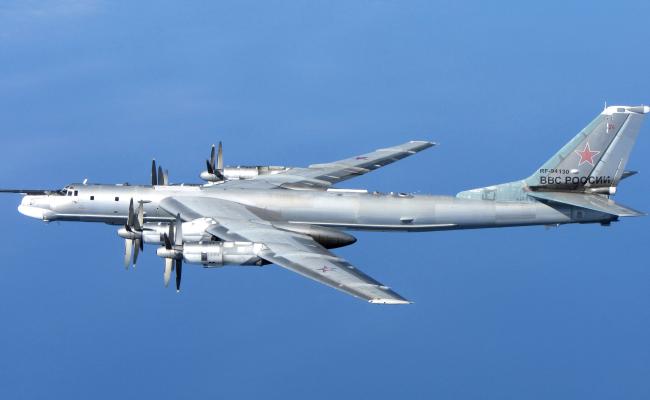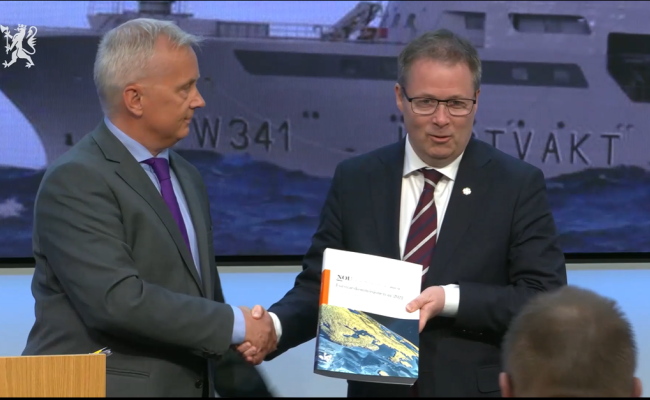Norway's Chief of Defense Wants To Increase Firepower in the North
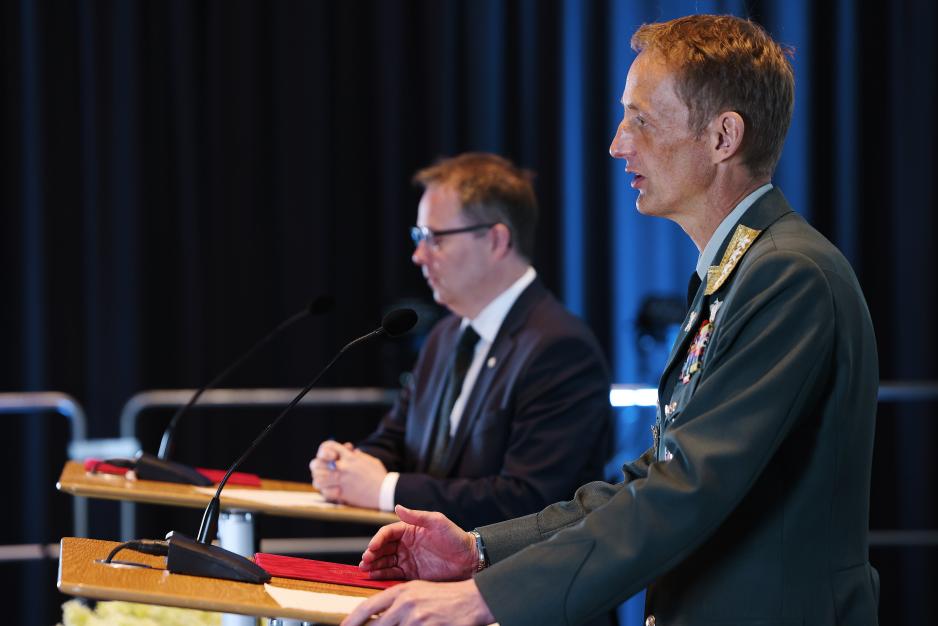
MoD Bjørn Arild Gram (Center) and Chief of Defense General Eirik Kristoffersen during the presentation of the Military Advice of the Chief of Defence 2023. (Photo: Torbjørn Kjosvold / The Norwegian Armed Forces)
The threat from the East is growing and Norway´s Chief of Defense Eirik Kristoffersen wants to strengthen the defense in the north and points to Svalbard as a particular strategic military area of interest to Russia. "The strengthening of the defense must happen quickly," says the Chief of Defense.
On Wednesday, the Norwegian Chief of Defense presented the Military Advice of the Chief of Defence 2023 to MoD Bjørn Arild Gram (Center). Among other things, Kristoffersen calls for an entirely new battalion in the land defense of Finnmark, Northern Norway.
Norway lacks sufficient air defense and the ability to defend against ballistic missiles and drones. Therefore, Kristoffersen wants to invest in new long-range air defense systems, as well as strengthen the ability to combat drones.
"The number one priority is to increase firepower in our northernmost region by strengthening adopted plans to establish a full-fledged long-range rocket artillery battalion in the land defense of Finnmark," said Kristoffersen during the press conference on Wednesday.
The Chief of Defense says that both Brigade Nord and the land defense of Finnmark should be equipped with short-range air defense which is also effective against drones. Parts of the air defense should be based on a mobilization scheme.
Five focus areas
The Chief of Defense recommends five specific focus areas for the development of the Armed Forces:
- Improvement of known weaknesses in today's structure
- Strengthening the Armed Forces' ability to operate in the maritime domain
- Increase the ability to protect both military and civilian targets against air threats
- Increase the Armed Forces' ability to combat targets at long distances
- Strengthen the capacity for endurance through a further increase in the volume of the Armed Forces
The probability of a conflict involving Norway has increased.
The advice from the Armed Forces is to be used in a long-term plan. They will be presented to the Norwegian parliament at a later time.
The professional military advice comes at the same time as the Defense Commission and the Total Preparedness Commission's recommendations for the security of the kingdom in the coming years.
The risk of conflict increases
Kristoffersen has no doubt that Russia now poses the biggest threat to Norway.
"Their attack on Ukraine showcases that. The probability for a conflict that involves Norway has increased," says the Chief of Defense.
"The significance of our immediate areas, the High North, and the Arctic has also increased. Our allies have a greater presence in our immediate areas than before and the development will demand more of Norway in order to maintain our influence and protect our situational awareness," says Kristoffersen.
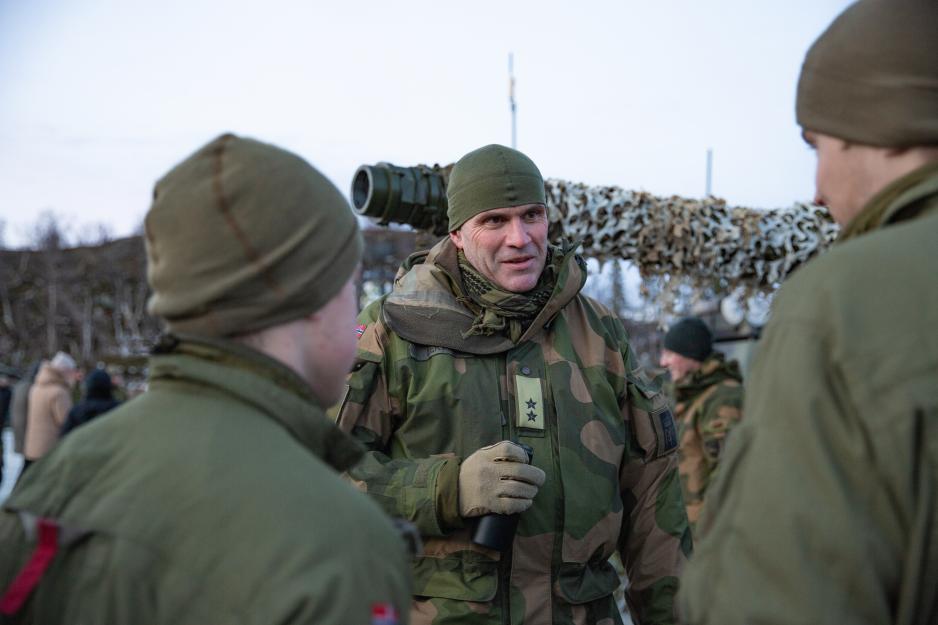
Chief of the Norwegian Army, Major General Lars S. Lervik, visited the army forces of Brigade Nord during the Arctic Bolt exercise in Troms at the end of November. (Photo: Synne Nilsson/the Norwegian Armed Forces)
Increased vulnerability
That the need for strategic dominance in the Arctic is central to the Russian defense mindset is made clear in the report.
"Russia may abandon the ambition for low tension in our immediate areas in the coming ten years. As a consequence of the war in Ukraine, the Russian vulnerability has increased and Russia considers that the Arctic will be affected by the tense relationship with NATO," says Kristoffersen.
"Russia's strategic dependence and sensitivity around the Russian base complex on Kola is increasing and the traditional military-strategic aspects connected to Norway's geographic location in regard to the 'Bastion Defense' remain," the report reads.
He also considers that Svalbard will have an increased military-strategic value for Russia.
"The development entails that Norway's political and military room for action is challenged. In sum, the risk of misunderstanding and escalation heightens in the north."
These are the the Military Advice of the Chief of Defence
The development of the Armed Forces and the defense sector is determined through four-year plans, so-called long-term plans. The government is currently working on a new long-term plan for 2024-2027. The plan lays down guidelines for how the Armed Forces is to develop during the four-year period.
The government requires input and advice from experts, researchers, professionals, and from the sector itself when developing the plans. In November of 2022, the government, therefore, asked for the advice of Chief of Defense Eirik Kristoffersen.
The work with the professional military council (FMR) has been ongoing since was made public on June 7th, 2023. In the council, the Chief of Defense gives specific recommendations on how the Armed Forces can be further developed.
The government must then consider the advice of the Chief of Defense and utilize it in the continued work on the long-term plan. The government will then present its suggestion for the long-term plan to the Norwegian parliament.
Source: the Norwegian Armed Forces
Positive NATO membership
The General believes that in the event of a Russian attack on Norway, it would probably aim for military and socially critical targets across the country in an attempt to weaken both the Norwegian military ability and the will to resist.
The Chief of Defense believes that Finnish and Swedish NATO membership affects Norway and its allies' security in the High North and the Baltic Sea area in a positive way and that Norway's significance as a reinforcement area in the Nordic region has become more important.
"Norway is currently in a security situation that is affected by a significant gravity in which Russia appears as an unstable and unpredictable actor. And there are few signs of political change in Russia. Therefore, Norway must contribute to stability and predictability in our immediate areas and be prepared to take on greater responsibility for our own security, but also for the alliance," says the Chief of Defense.
Urgent
"Thus, my assessment is that Norway must strengthen its defense ability both nationally and within the NATO framework. And this strengthening must happen quickly. Currently, the Armed Forces does not have sufficient abilities for defending military and civilian targets against air threats. Or for combating targets at long distances. Our ability to maintain presence and operations in our maritime areas of interest is also too weak."
Norway's large sea areas, long coastline, and significant economic interests in the maritime sector make it necessary to develop the Armed Forces' ability to handle activity that threats and challenges national interests both underwater, on the surface, and in the air.
"Russia has its most important marine base on the Kola Peninsula and develops modern, quiet, and powerful submarines. The capability for anti-submarine warfare, in cooperation with allies, especially the USA and Great Britain, is therefore a priority capability in the future as well.
Replacement of vessels
In his advice for the government, the Chief of Defense believes that there is a need to increase the defense sector's funding with about NOK 8 billion more each year from 2025 to 2032. The total increase is in addition to already planned funding, with the expectation of the government's recent decision to reach NATO's two percent target by 2026.
All Navy vessels must be updated and the Chief of Defense wants six new frigates to increase their ability to defend their own and allied defense of Norwegian sea areas. As well as up to four large standard vessels and up to 16 smaller standard vessels with modular weapons and sensor systems aboard.
The phasing in of new vessels should take place in the time between 2027 and 2037.
The government will look at how we can support development in Eastern Finnmark to a higher degree.
In the Military Advice of the Chief of Defence 2023, it is also suggested that the Coastal Ranger Commando in Harstad is to be strengthened with unmanned drones and new weapon systems.
Gaps in the defense system
The Norwegian defense does not have enough volume to carry out operations over time.
"We must increase the volume of the Armed Forces and implement measures to increase the Armed Forces' abilities for situational awareness, our ability for command and control, and our firepower and mobility should be emphasized," believes the Chief of Defense.
Norway's northern areas and Eastern Finnmark in particular have been given attention in the advice.
MoD Bjørn Arild Gram emphasizes that Norway needs a viable northern region and that it is important to Norway that people live in Finnmark.
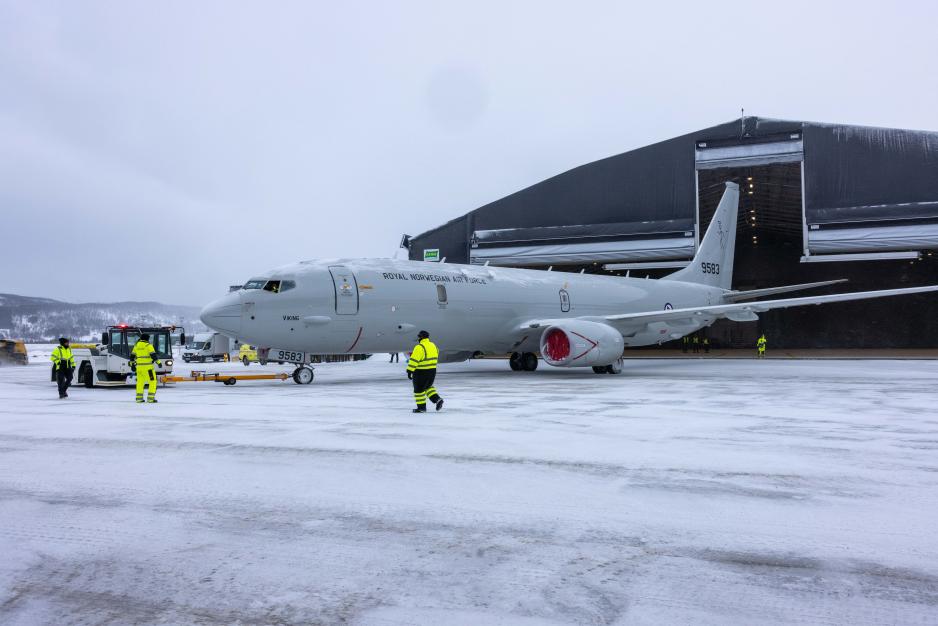
One of the new maritime patrol aircraft of the type P-8A Poseidon at Evenes Air Station, north in Nordland county. Norway has ordered five of these from the US. (Photo: Philip Linder/the Armed Forces)
"It is important that there is value creation and activity there. In crisis and war, the Armed Forces will need support in its military operations. Having a total defense to build on is important and we are dependent on civilian infrastructure and activity, expertise, and materiel. The government will look at how we can support development in Eastern Finnmark to a higher degree," says Gram.
Total defense
Northern Norway has always been a priority area for Eirik Kristoffersen.
"One of my biggest wishes when I took office, was more civilian jobs, education, and kindergartens in the areas in which the Army is present. Inner Troms, Finnmark, and Østerdalen," says the Chief of Defense.
"It is an important aspect to recruit and keep people over time, that there is a good civilian community around our military camps."
Transfer of Evenes
It is recommended that Evenes Air Station is transferred to the Air Force. Evenes Air Station is the main base for Norway's maritime patrol aircraft and is a forward operating base for the F-35 fighter jet.
"The Chief of Defence recommends facilitating more efficient operation of the Air Force’s air wings and air bases. Air bases must be strengthened as a combat structure, and units and functions central to the operation of the air bases should be subordinated to the Air Force. As one of the Air Force’s most central air bases, responsibility for base operations at Evenes Air Base should be transferred from AVINOR to the Air Force, to ensure military control in crisis and in war," reads the Chief of Defense's recommendations.
The Chief of Defense also recommends acquiring a full-fledged simulator for the patrol aircraft at Evenes. The Chief of Defense believes this will provide significant benefits through increased operational ability and availability, as well as major sustainability benefits in the form of reduced personnel, economic savings, and reduced emissions.
China challenges the West
The report points to how Russia's intention to weaken the US and the West's influence is shared by China. The cooperation between China and Russia will become increasingly closer, something China considers to be beneficial to the country's interests and influence, including in the Arctic.
"Russia is becoming more dependent on China as a consequence of the war and the Western sanctions. In the long term, Russia may be forced to make concessions to China in the High North as well. In our neighboring regions, Chinese activity has so far primarily been linked to research and commercial interests, as well as activity in both space and cyberspace, but this situation may change," believes Kristoffersen.
The significance of international frameworks and rules is reinforced by how climate change is making the Arctic more available to civilian and military activity, reads the report.
In sum, the Norwegian Armed Forces is painted to be an organization with major weaknesses and gaps.
"Within the current economic framework, it is not possible to make the structure we already have work in line with the conditions," says Chief of Defense Eirik Kristoffersen.
Also read
This article was originally published in Norwegian and has been translated by Birgitte Annie Molid Martinussen.


